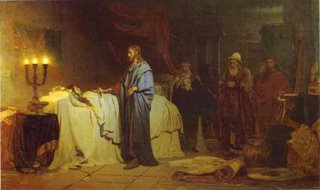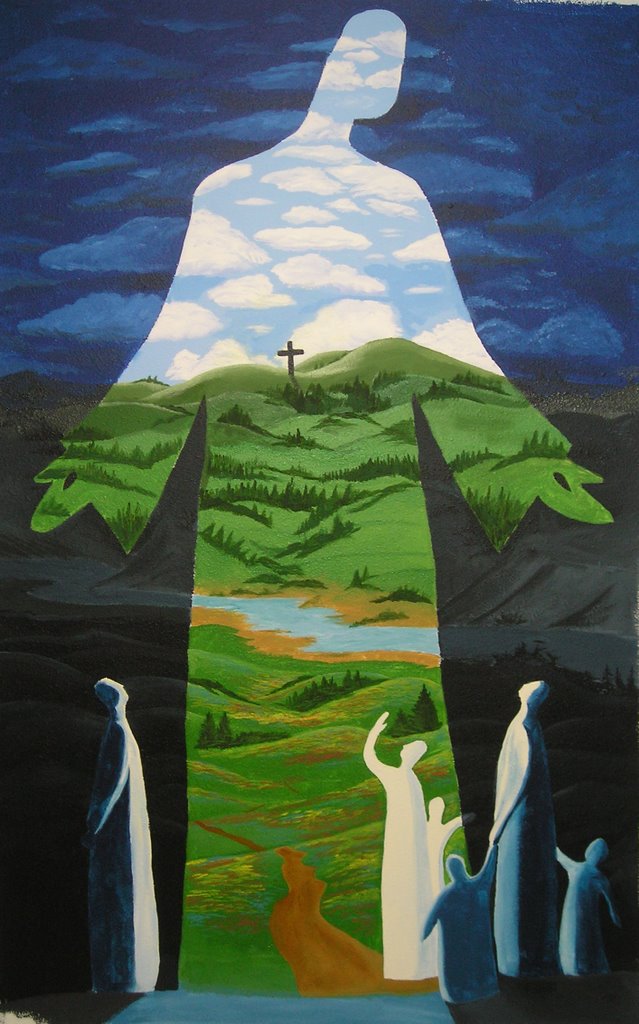Pentecost 2 – (June 18th, 2006)
Mark 2:23-28
“On the Sabbath…” I. Introduction –
I. Introduction – “Observe the Sabbath day by keeping it holy, as the Lord your God has commanded you.” These words from our Old Testament reading, which we have come to know as the 3rd commandment, form the backdrop for our Gospel reading from Mark 2. There Jesus discusses with the Pharisees, the application of the command – and the reason the Sabbath day was given.
The word “Sabbath” literally means, “Seventh”. But it has come to mean also a “day of rest”. As we consider this in light of our own observance of the Sabbath, perhaps we can ask three fundamental questions about this holy day. The Sabbath, “When is it?”, “Why is it?” and “WHO is it?”
II. When is it?-Creation and the first Sabbath
To understand the Sabbath day, we must go back to creation itself. In the first chapters of Genesis we read how God created the Heavens and the Earth, and everything in them, including man and woman, by his Word, in just 6 days. “On the seventh day, he rested from all his work” Furthermore, “God blessed the seventh day and made it holy, because on it he rested from all the work of creating he had done”. And so perhaps the first thing this 7th day of the week should remind us, is that the Lord created us and everything we see. And then, he rested.
-OT Sabbath observation
At Mt. Siani with the giving of the Covenant, observance of the Sabbath became a cornerstone of Israelite life. A time to rest, a time to gather, a time to read and hear God’s word. A “Holy Day” in the truest sense, a day that was “set apart” to dwell on those things “set apart”. Jesus also frequented the synagogue on the Sabbath day, as did the faithful believers.
-NT Sabbath on the “Lord’s Day”
But then a change took place in the observance of Sabbath. And if you’ve been wondering why we Christians don’t worship on the 7th day of the week, the answer is in the New Testament. There it is clear that the early Christians began to gather on Sunday, “the Lord’s Day” as it is called, to honor the resurrection of Jesus. For on the first day of the week, Sunday, Jesus conquered death and won the victory for us.
-Freedom to find rest in Christ any time
In fact, because Christians are now freed from the Old Covenant, which was fulfilled in Christ, we are able to find our rest in the Lord on any day. Still, the church honors Sunday for many good reasons, and it remains the chief day of gathering for God’s people. But Paul’s guidance in Romans 14 is well taken, “One man considers one day more sacred than another; another man considers every day alike. Each one should be fully convinced in his own mind. He who regards one day as special, does so to the Lord.”
So much for the “When?”. Perhaps a better question is, “Why do we have a Sabbath day?”
III. Why is it?-To fulfill a law?
Since before Jesus time, man has sought to add his own laws to God’s law. And so the Jewish legalists over-defined the guidance of Moses so that even common tasks were considered work.
To this day, Orthodox Judaism concerns itself which such questions. When the Senator Joseph Lieberman, a practicing Orthodox Jew, was running for Vice President, questions were raised about how his observance would affect his ability to perform in high office – when on the Sabbath, strictly speaking, even turning out a light switch is considered work, and forbidden, by these laws.

But it’s not just the Jews who tend toward legalism. All of us born under the law and stricken with sin – we fancy legalistic lines, and man-made markers. If we can clearly define what is forbidden, you see, it leaves our consciences with a false sense of security. “Oh, all I have to do to keep this commandment is…. Not go to work on Sunday? Go to church once a week, or once in a while? As long as I don’t mow my lawn, I’m in the clear, right?” Why did God create the Sabbath day? Surely it was not to indulge our legalistic tendencies…
-Perhaps the Sabbath was created as a special day for us to do something nice for God, or give back to God?
Here again, we must say, “No!”. This goes against the grain of all we know from scripture about our sin and how it is dealt with. We won’t and we can’t possibly earn our way into God’s favor – not by a long list of good works, not by a keeping of commands, and certainly not by exacting performance of religious ceremonies.
Simply coming to church does not make you a good Christian anymore than going to a restaurant makes you a chef, or going to a football game makes you a Quarterback. It earns you no special brownie points with God, who doesn’t gain anything because you have graced him with your presence. “Oh, thank you SO much for coming! I was so lonely here without you, now let me give you blessings in return….” No, God is not impressed that you took an hour out of your busy schedule for him.
This day is not a benefit for him. It’s not really even a day to praise and honor and glorify God. It’s not a day to tell him how good he is, and how much we love him, and adore him, and honor him…. What does Jesus say? “The Sabbath was made for man” It is a day for OUR benefit!
What do we get out of coming to church, observing the Sabbath day?
- We get to see our friends? Christian fellowship is all well and good, but no, not the point.
- We “feel” better? It can be a good feeling to worship, but Sabbath observance is never based on mere human emotions
- We receive God’s gifts! Yes! This is it! This is what the Sabbath is about, why it was created for Man, why it is holy and blessed – to be a blessing to us! And the blessings of the Sabbath day lead us to our next question –
“Who is the Sabbath all about?”
IV. Who is it?The Sabbath isn’t about us.
You might think so from Jesus saying, “the Sabbath was made for man” But not so! It is about Jesus Christ. For he is Lord of the Sabbath and he’s also the giver of rest for our souls. “Come to me all you who are weary and burdened, and I will give you rest” (Matthew 11:28). The Sabbath is all about Christ.
Jesus gives rest for the soul – rest from sin. His death on the cross paid the price, did the work to pay off the debt of our sin. And we are free and clear! His resurrection turns death into life, not just for him but also for us, and only in Christ can we truly “rest in peace”.

Jesus is the Lord of the Sabbath. Jesus is our Sabbath-rest. No the Sabbath day was never about the law, but always about the Gospel. Less a requirement than a blessing, less “you must…” than “we get to…”. The Sabbath was made as a day of rest for man to find his rest in Christ, who brings eternal, complete, and final peace… calm… rest.
It’s interesting to note that on the Sabbath, Jesus’ disciples we busy eating. They were hungry, and so they ate. So too, on our Sabbath we find food for our hungry souls. We find just what we need, in Christ.
And so, we Christians, come to gather in Christ’s name and presence. We come to hear rest from our sins – confessed and forgiven. We come to hear that rest in His word, read and proclaimed. We come to taste that rest in bread and wine that is true body and blood for our forgiveness. Fed and nourished, well rested, we depart in peace.
So remember the Sabbath day, keeping it holy. Remember we are free to find rest anytime – and all the time. Remember the Sabbath day, that it was made for man, not the other way around. And remember who the Sabbath day is about – not us, but Christ – who is our Sabbath rest.
V. Conclusion
“The Son of Man is Lord even of the Sabbath!” Thank God for this day of rest, and for Jesus Christ who gives us eternal rest. In His Name. Amen.















